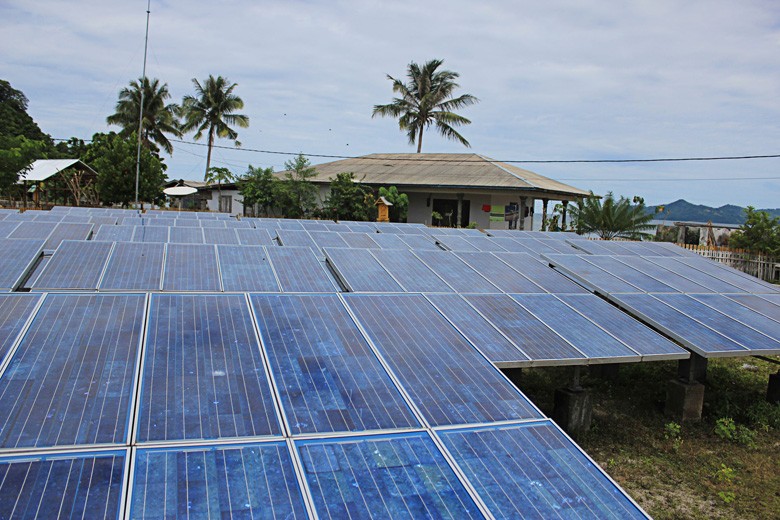Indonesian institutions struggle to get funding for green energy projects
Change Size
 Renewable energy: Solar panels sit in a residential area on Ponelo Island, North Gorontalo. A solar power plant (PLTS) with a capacity of a 2 megawatt-peak (MWp) is operating in East Sumalata district, North Gorontalo. It is the biggest solar plant in Sulawesi. (thejakartapost.com/Syamsul Huda M.Suhari)
Renewable energy: Solar panels sit in a residential area on Ponelo Island, North Gorontalo. A solar power plant (PLTS) with a capacity of a 2 megawatt-peak (MWp) is operating in East Sumalata district, North Gorontalo. It is the biggest solar plant in Sulawesi. (thejakartapost.com/Syamsul Huda M.Suhari)
S
ecuring funding for environmentally friendly projects has not been a straightforward process for Indonesian companies and organizations, many of which are unaware that certain standards need to be fulfilled before applying for funding for green energy projects at international and multilateral organizations.
The standards are considered basic: Write a clear proposal and comply with the principles of equal opportunity for all genders and minority groups.
The United Nations through its Green Climate Fund (GCF), for example, requires proposals to be aligned with national development priorities and gender equality standards and accommodate the needs of vulnerable groups.
In Indonesia, the GCF has been working with Finance Ministry’s Fiscal Policy Office and intergovernmental organization Global Green Growth Institute (GGGI) since 2017.
Thus far, only PT Sarana Multi Infrastruktur, a government-backed infrastructure financing firm, has met GCF requirements. Working with GCF are two other Indonesian institutions: private infrastructure company Indonesia Infrastructure Finance (IIF) and civil society group Partnership for Governance Reform (Kemitraan).
One of the GCF’s gender equality requirements was to ensure a balanced amount and equal opportunities for both men and women employees, said Meirini Sutjahjo, head of communications for Indonesia at the GGGI.
“It [meeting the gender requirement] is one of our challenges to find entities eligible for GCF funding,” she said.
Acting as a pool fund for public and private investment since 2014, the GCF’s total portfolio value is US$16.4 billion, comprising pledged, committed and implementing funds worth $10.3 billion, $4.6 billion and $1.8 billion, respectively, according to its website.
The GCF will give accreditation for eligible applicants, which can ask for funds ranging from less than $1 million to more than $250 million for each project.
The government acknowledged that having access to alternative sources of funding to finance green projects would help reduce the problem of inadequate investment in the renewable energy sector, which is growing at a snail’s pace.
“Aside from helping us in terms of grants or soft loans, they [foreign institutions] are also [helpful] in capacity building, such as project preparation,” said Harris, director for new and renewable energy at the Energy and Mineral Resources Ministry.
“We need good-quality proposals [to apply for international funding].”
The national goal is to cut greenhouse gas emissions to around 800 million tons of carbon dioxide by 2030, with 39.25 percent coming from the energy sector, which still heavily relies on coal and fossil fuel.
As of 2018, Indonesia has been reducing greenhouse gas emissions at a rate of 43.8 million tons of CO2 per year, only 13.9 percent of the targeted 314 million tons of CO2 per year until 2030.
The reliance on traditional energy resources is evident in the country’s use of coal-based electricity, which will continue to account for more than half of power generation until 2027. Renewable energy, meanwhile, makes up 12 percent, as of 2018.
Although there has been an increased use of renewable energy over the past few years, Harris noted that there was little progress in green projects, which were struggling to seek financing amid a high reliance on fossil fuels.
Data from the ministry show that 30 out of the total 75 power purchase agreements in renewable energy with a total capacity of 1,581 megawatts have yet to obtain financing. Most of the agreements were signed in 2017.
Harris said small-scale green energy projects were the most difficult to fund. “As a solution to this, we are connecting them with the National Development Planning Agency’s [Bappenas] Center of Private Investment [PINA].”
The PINA division is tasked with searching for alternative sources of funding for various infrastructure projects outside the state budget.









